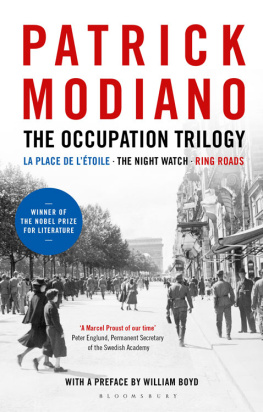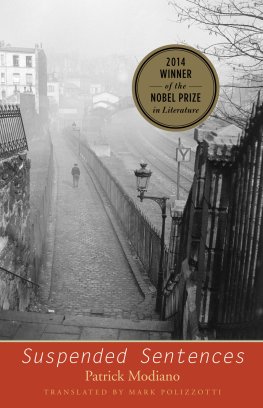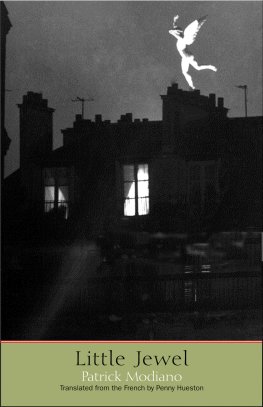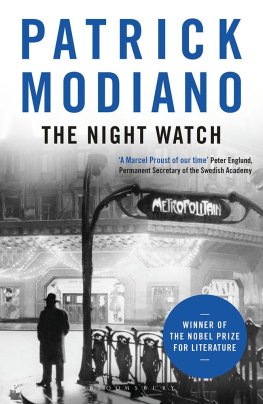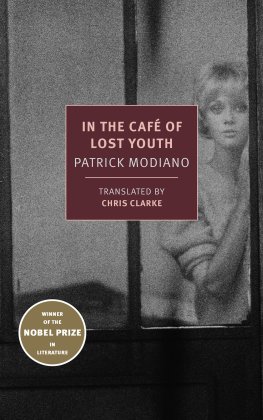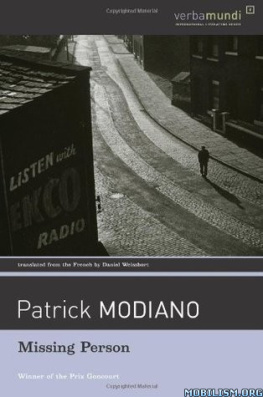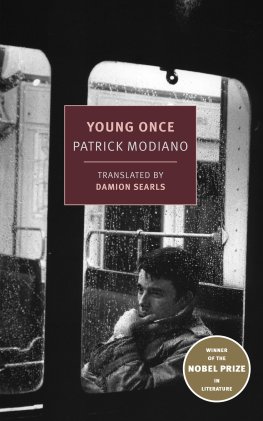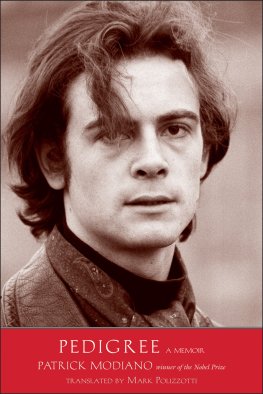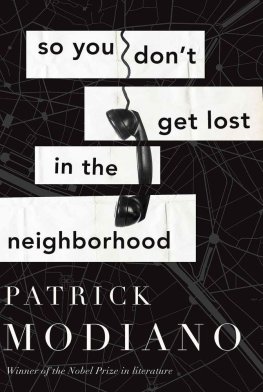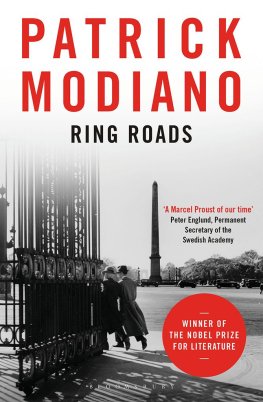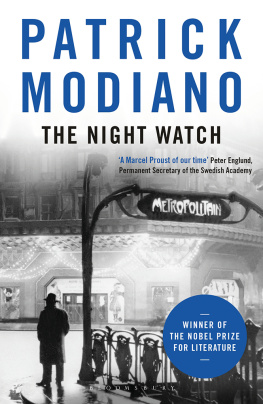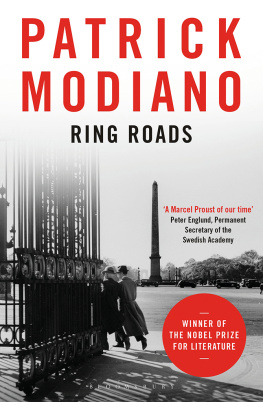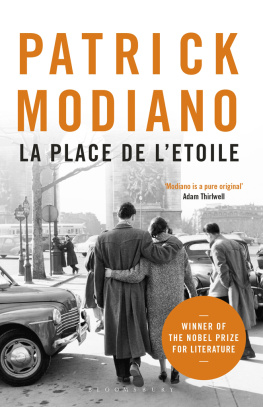

As our journey into the future continues the present moment drifting away, our own biographies lengthening, our pasts receding, inexorably, quietly becoming history in the distance so certain aspects of those retreating eras seem to come more sharply into focus and claim our attention. The longer view allows us to see these features of the recent past as truly defining characteristics of those decades that weve lived through.
Take 1968, for example, nearly fifty years ago now, the year that the first novella in Patrick Modianos Occupation Trilogy was published. In 1968 I was running my schools film society. I decided to conclude my tenure of the role with a controversial double bill and duly screened Alain Resnaiss Last Year in Marienbad (1961) and Federico Fellinis Juliet of the Spirits (1965). I confess the choice was entirely pretentious, a consequence of pure sixth-form pseudo-intellectual bravado, but, while I was genuinely baffled by Marienbad, I was haunted by Juliet of the Spirits for reasons that defy cogent analysis and the film remains similarly haunting today, after several further viewings over the years. Something about those two films sums up for me the cultural mood of the 1960s or at least one aspect of the cultural mood of that time: they are wilfully difficult to understand; they play fast and loose with chronology and ratiocination; the surreal seems more pertinent and familiar than the real. But in those days this seemed intensely stimulating and exciting we were drawn to an art that occupied the mysterious, the vague and the allusive rather than one that conventionally confronted the blunt realities of the here and now.
Patrick Modianos three short novels La Place de ltoile, The Night Watch (originally published in English as Night Rounds) and Ring Roads resonate with that same knowing liberty and cool audacity and, as a result, Modiano became a modish and cult author at the time. Reading these novels anew for this introduction, I was still struck forcibly by this 1960s free-wheeling, free-form disregard for the well-constructed solidities of the traditional novel. Their tone, their style and their values are very much creatures of the time of their writing.
But Modianos trio are not just convenient cultural touchstones. There is an element in them, underlying the careful obscurantism and the nonchalant moodiness, that gives a deeper resonance. Its important to remember that Modiano was exceptionally young when they were published: he was twenty-two when La Place de ltoile appeared in 1968. The Night Watch arrived a year later and he was only twenty-six when the last of the trilogy, Ring Roads, emerged in 1972. They are bravura, young-mans novels, particularly the first, which announced the advent of a precocious literary talent and star. All three are short, each just over a hundred pages, and they gain their collective title from the connection with LOccupation Frances enduringly bitter and divisive subjugation by Nazi Germany during 194144.
La Place dtoile is the most frenetic. Its as if the young Modiano had gathered together every controversial and combustible issue of twentieth-century French history and literature and whatever else took his fancy and thrown them together in this rambunctious tale of a Jewish collaborator called Raphael Schlemilovitch. Anti-Semitism, the Gestapo, Dreyfus, Auschwitz, Action Francaise, collaboration, betrayal and bad faith all contribute to the neurotic picaresque of this episodic and still startling, shocking novel. If, today, Michel Houellebecq is considered the bad-boy of contemporary French literature then he must have learned a lot from La Place de ltoile: blatant offence is freely given, taboos are blithely violated and no sacred cow is sacrosanct as we explore the fraught psychic landscape of Raphael Schlemilovitch, Jew turned Nazi sympathiser. He is, of course, the ultimate unreliable narrator. At one stage he fantasises about seducing Eva Braun and talks of his meetings with Hitler. When, at the novels end, he wakes up entirely improbably on the couch in Freuds Vienna consulting rooms, everything we have read before is thrown into stark, sceptical relief.
Both The Night Watch and Ring Roads also deal with the Occupation. The Night Watch is the story of a young French collaborator instructed to break into and betray a resistance cell. In this novel, the narrator is unnamed and the point of view more subjective. There are long passages of unparagraphed internal monologue interspersed with lyrics from popular pre-war songs as Modiano confronts Frances guilty ambivalence about the Occupation years. In La Place de ltoile Schlemilovitch reflects that There were many of us who slept with Germany and the memory of it is sweet. In a significant way this assertion is the bedrock of all of Modianos fiction since his debut in 1967, a fact highlighted by the Nobel committee when they awarded him the literature prize in 2014.
Modiano was born in 1945 and has written of his own struggles to come to terms with what occurred in France during the years immediately prior to his birth. His father, a Sephardic Jew of Italian origin, seems to have been involved in the wartime black market and some form of petty gangsterism but never told his son anything of his life between 1941 and 1944. Therefore it is not surprising that fathers and father-figures proliferate in all three novels, notably in Ring Roads, the most terse and oblique of the three. It concerns a sons quest for his father, a man somehow confined in a strange commune in a village near the forest of Fontainebleau. Modiano has a great facility for topographical description, both evocative and precise, but in Ring Roads everything else is deliberately blurred, including the historical period. Only at the end does it become apparent that the central characters search for his missing father is taking place during the war. The encounter is unsatisfactory the father has no recollection of his son, while the sons abiding memory is of his fathers attempt to kill him by pushing him under the wheels of an underground train, some ten years before the events of the novel begin.
There is a change of style in Ring Roads noticeably shorter sentences, a clipped objectivity. Modiano was classified by critics as having joined the ranks of the nouveau roman but, whatever the novels mannered obliquities, the same historical concerns run beneath the surface. The novel has an epigraph from Rimbaud: If only I had a past at some other point in French history. But no, nothing. This, you might imagine, is Modianos private plaint: condemned by the date of his birth and the shady wartime career of his father to spend his literary working life exploring the consequence of LOccupation, Collaboration and Rsistance such as it was. He has often been a brave and solitary voice what happened between 1941 and 1944 is not a subject that is raised in France with much enthusiasm, even today.
However, perhaps Modianos most controversial move in airing and confronting the unspoken subject of the widespread passive and active collaboration of the French population in the Second World War occurred just after the publication of Ring Roads when, working with the director Louis Malle, he wrote the screenplay of the film Lacombe, Lucien (1974). It is effectively the fourth panel of the trilogy, making it a tetralogy, and the light it casts back on the three novels is revealing.
Next page
